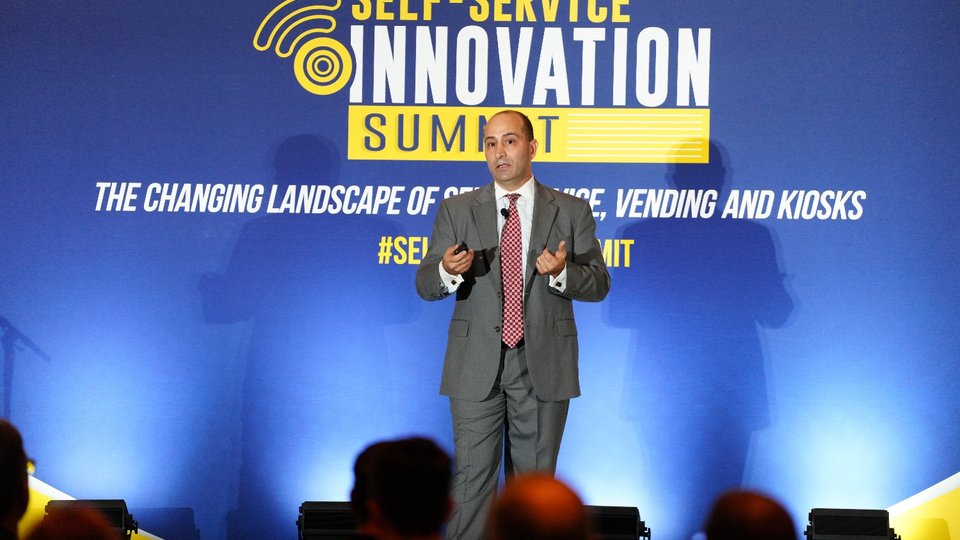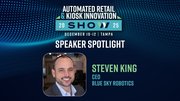Automated Retail & Kiosk Innovation Show
Migrating to self service: A roadmap to success
Mike Abecassis, founder and CEO at GameTime and General Vending Service, delivered the opening keynote address at the Self-Service Innovation Summit, exploring the history of self-service and principles for success.

December 5, 2023 by Daniel Brown — Editor, Networld Media Group
How can a remote hotel in the Swiss Alps in the 1990s teach modern vending operators how to surprise and delight an expanding customer base? And exactly what do the fabled Disney World tunnels underneath Orlando have to teach us about software development and user experience?
These were only two of the questions explored in an opening keynote by Mike Abecassis, founder and CEO at GameTime and General Vending Service, a Florida-based family-owned amusement vending operator that also offers brick and mortar arcade and dining across a suite of offerings including arcades, bowling centers, sports bars and restaurants.
Abecassis delivered the keynote to a rapt audience in the main conference hall at this year's Self-Service Innovation Summit in Miami, Florida, hosted by Networld Media Group at the Loews Coral Gables hotels.
"We can take almost anything we're selling, as a service or a product, and we can turn it into self-service." Video credit: Networld Media Group/Daniel Brown. |
Key takeaways
Abecassis exemplified each of his principles of success with vivid stories from decades of experience with vending that began when he became enchanted at a young age with the way vending machines automated the process of selling and making money (and the realization of what happens when this is done at scale).
Key takeaways included:
- The customer experience is the core of success or failure.
- A friction-free app and mobile experience is increasingly central to every business and vertical.
- Think through the entire customer journey, from start to finish, and design every step to surprise and delight your customers.
- Listen to your customer feedback and adapt your approach accordingly.
- If you're passionate to impact customers, you just might change the industry, or the world!
How a boy in the Alps became a man on a mission
 |
Image: Networld Media Group/Willie Lawless. |
Abecassis has been obsessed with vending machines and self-service from a young age, when he learned about the power of automated selling and profits; but it wasn't until a family vacation in Europe as a boy that he learned a lesson that would shape his career and philosophy.
His family ended up deep in the Swiss Alps at nightfall in the early 90s, as he tells it, desperately needing a place to stay. However, the only small hotel they could find was un-staffed, and things looked bleak until they spotted a vending machine placed against a wall of the hotel.
An almost futuristic notion in those days, the vending system took payments, issued receipts and granted customers a door code to unlock rented rooms — with no need for human intervention. Even though there were no instructions in English, the system was designed intuitively, and the experience shaped Abecassis for a lifetime.
"If the guest experience is compelling, I'm going back on a regular basis," he said, explaining a philosophy that has guided his career for decades.
What a 19th century undertaker can teach modern vendors
Somewhat paradoxically in today's age of holograms and artificial intelligence, Abecassis believes that history has a lot to teach us about success in vending and self service. No matter how much we innovate, the customer must be at the center of each innovation, and by relentlessly pursuing your needed outcome, you can not only transform an industry, but sometimes the world.
Abecassis illustrated this with the story of the invention of the modern switchboard system, which allowed the early telephone to evolve away from rotary dials and switchboard operators to an automated system.
As the story goes, Almond Strowger was an undertaker with a thriving business who was confused when a friend passed away and instead of coming to him for services, the family of the deceased chose a competitor. "After digging around, he found a competitor's wife worked at the switchboard operator."
Strowger was incensed to learn that his competitor's wife was actively diverting calls about funeral services to her husband's business. Determined to create a fair system that did not allow such favoritism, the undertaker set to work, not just for his own benefit, but to help all telephone users. "He was compelled to make an impact," Abecassis said.
By inventing the Strowger Switch (which led to modernized automatic telephone services), the undertaker didn't simply rescue his business from unfair competition; he illustrated a principle that is at the core of success for modern business owners from all categories. Passion and a single-minded focus on fixing a problem by generating a desired outcome is the secret to innovation.
"The operational efficiencies of having [the kiosk] there and it being ready all the time is one of the reasons that I think self-service starts to get implemented more." Video credit: Networld Media Group/Daniel Brown. |
From rotary dials to smartphones: self-service transformation
On the subject of telephones, the smartphone is the source of the next principle of successful innovators: make it intuitive.
"The most impactful device in history is probably the iPhone or smartphone in general," he said, noting that despite being one of the most complex and powerful inventions ever, the devices are carefully designed to be intuitive in such a way that the entire planet has adopted them.
"This device doesn't really come with a manual, and yet it is the most complicated device any of us have seen. It simply has an intuitive interface.
"There is a reason that a digital folder still looks like a physical folder," Abecassis added, "because that makes sense to us. If our guests can figure [a product] out without reading, we have accomplished a major goal."
It was the same design principle that allowed a chilly American family in the French Alps to find warmth and shelter on their vacation all those years ago, thanks to a well-designed self-service system.
 |
Key elements to the power of self-service. Image: Networld Media Group/Daniel Brown. |
"The cost of perfection is progress"
Still, it's easy to fall into an expensive (and common) mistake in the vending and self-service business: the impossible pursuit of perfection.
"The cost of perfection is progress," Abecassis said, noting that his team has adopted this maxim as a way of life. "We would rather have the progress."
The longer a product idea sits in development, the more cash is burned, and the longer it takes to get into the field, where the really useful data happens; until you get feedback and data from real customers using a product or system, Abecassis explained, you won't make meaningful progress in refining your design. In other words, "the perfect is the enemy of the good," as the saying goes, or to adopt a famous Silicon Valley proverb, "better done than perfect."
It's a pattern in the industry that goes back for years. Abecassis remembers visiting a major vending company in the mid-2000s to pitch a product idea. He was astonished to arrive at the legendary company's world headquarters to find only a small office; when he was granted a confidential look at the one major product in development, he was shocked to hear it had taken three and a half years to develop and $250 million, and it still hadn't even been beta-tested in the field.
While the value of good design is unquestionable, especially in casino machines, where increasing dwell time by even 30 seconds per customer can mean millions in revenue at scale, the takeaway was clear.
Even if you design something to where you think it is perfect, you'll realize tomorrow that it still needs tinkering, and then when a customer tries it out, they'll find fault and give feedback on improvements. "Perfect is a moving target," Abecassis said, noting that his company has learned to put out new product ideas early, before they feel that they have reached "perfection," so that they can get real customer feedback and make improvements quickly.
It's the same problem that so many companies experience when they try to create their own website instead of outsourcing, only to find that it is an infinite time sink, with massive cost attached to the growing delays.
 |
Elliot Maras, editor, Kiosk Marketplace and Vending Times, asks a question about the future of VR during the keynote's Q&A session. Image: Networld Media Group/Daniel Brown. |
Additional trends, predictions, and success tools
With vivid stories and examples, Abecassis shared additional trend predictions and principles for success in the face of the unknown as the industry changes. Edited for length, they are summarized here.
- The smartphone is arguably the single most world-changing and complex invention ever, but the whole world embraces it thanks to its intuitive design.
- This is how self-service and customer experience generally should be designed.
- Success requires being intuitive. "If our guests can figure it out without reading, we have accomplished a major goal."
- The world is changing.
- Many in the industry consider vending and self-service to be deeply hardware-based (i.e., kiosks, etc).
- However, the rise of the smartphone and Internet-based technologies are quickly bringing a future where software, content and UX design rule, and hardware is secondary The onus is on users to provide the personal hardware.
- "The cost of perfection is progress. We would rather take the progress." Or, in famous Silicon Valley wording, "better done than perfect." Agile, rapid, iterative improvement is better for customers and less expensive for businesses than trying to find a "perfect" design before deployment.
- "If you leave the breadcrumbs, they'll leave their money, because the experience was more compelling."
- "Motion causes emotion, so if you're not moving much, there's not much emotion happening."
- "What can we break that can teach us something?" A principle for software development and business development alike.
- Data and analytics are central to knowing your customers. Use data-based decision-making.
- Operational efficiency means embracing Abecassis' definition of technology: "Technology is the ability to accomplish the same goal with the same effort under different conditions and on different occasions."
- Over the next decade, self-service will shift its focus to software, content and experience design instead of hardware. The onus for hardware will be put on the user.
- This will make some workflows easier, but software (the "Disney tunnels under Orlando") will become more difficult and complex, from security issues to welcoming a huge variety of user devices, including screen size, screen orientation and more.
- The power of good technology allows you to reduce human error, on both the customer side and the business side.
- Every area of your business is, in a real sense, a self-service experience. How can you improve and scale each one?
- Make your systems secure and comfortable for your users.
- Reduced friction is the name of the game. Automation can do this by removing difficulties associated with human error or staff having a bad day.
- Make sure your systems all work together; a broken API means bad customer experience.
- VR: "In the VR world, it's almost stepped way backwards, because it requires people to put on the tech… Motion causes emotion, so if you're not moving much, there's not much emotion happening… I think there is an interesting play on VR; I think it is an area where, again, the hardware onus will be put on the user. I also think the hardware is where the failure rates are; trying to keep up with software is the real race."
- Choose your business partners carefully; an excellent partner (or a bad one) can transform your business and your customer experience dramatically.
About Daniel Brown
Daniel Brown is the editor of Digital Signage Today, a contributing editor for Automation & Self-Service, and an accomplished writer and multimedia content producer with extensive experience covering technology and business. His work has appeared in a range of business and technology publications, including interviews with eminent business leaders, inventors and technologists. He has written extensively on AI and the integration of technology and business strategy with empathy and the human touch. Brown is the author of two novels and a podcaster. His previous experience includes IT work at an Ivy League research institution, education and business consulting, and retail sales and management.





